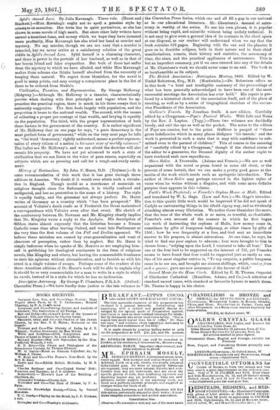History of Rationalism. By John F. Hurst, D.D. (Trilbner.)—It is
some reeommendation of this work that it has gone through three editions in America. We doubt if it would ever attain such a circula- tion in England. Though useful as a storehouse of materials on religious thought since the Reformation, it is wholly confused and undigested, and has no preteution to the name of a history. The style is equally faulty, and the grammar not always perfect. Dr. Hurst writes of Germany as a country which "has been prospered." His account of Voltaire's death reads as if Frederick the Great maintained a correspondence with Voltaire even after that event. His sketch of the controversy between Dr. Newman and Mr. Kingsley clearly implies that Mr. Kingsley wrote a reply to the Apologia. His description of Gibbon stateS almost expressly that the historian became a Roman Catholic some time after leaving Oxford, and went into Parliament at the very time the first volume of the Fall and Decline appeared. We believe these mistakes are caused by over-generalization and want of clearness , of perception, rather than by neglect. But Dr. Hurst is simply ludicrous when he speaks of Mr. Maurice as not employing him- self in publishing his theological sentiments in the form of religious novels, like Kingsley and others, but having the commendable frankness to state his opinions without circumlocution, and to furnish us with his creed in a single volume of essays. Perhaps some of the readers of the three American editions of Dr. Hurst's work will be able to explain why it should be so very commendable for a man to write in a style in which he excels, instead of in a style for which he has no inclination.






























 Previous page
Previous page